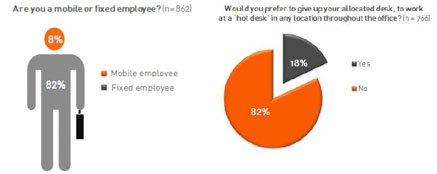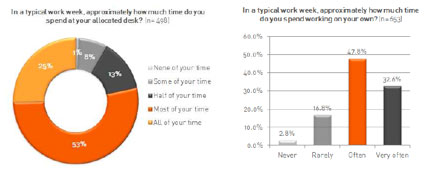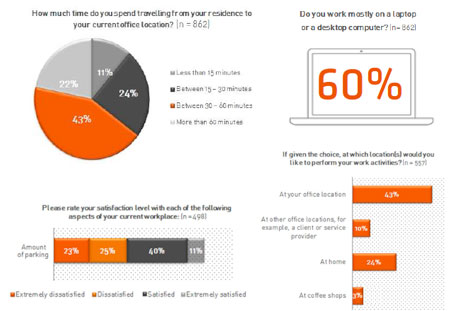
Top stories



ESG & Sustainability#BudgetSpeech2026: SRD grant unchanged, other Sassa social grants see hike
2 minutes

ESG & SustainabilitySouth Africa’s carbon tax should stay: climate scientists explain why
Britta Rennkamp et al. 1 hour


More news



















Lucy le Roux, marketing manager at Paragon Interiors, said: "To state the matter simply, the modern 9-5 office is evolving into a system where what you achieve is valued far higher than where or how you work to achieve it. This trend has been driven by high office rentals and traffic congestion in major global cities, advances in technology and an increasing number of self-managed knowledge workers in the workforce."
In research conducted by Paragon Interiors, only around 8% of those surveyed were classified as mobile workers. "To determine whether this number could be increased, there are a few factors that need to be in place. Firstly, employees need to be open to the idea of giving up their allocated desk space and adopting a more nomadic work style," said Le Roux.

They would also need to be able to work alone or outside of a team. The tools to empower this type of working would then be required, such as staff having access to laptops. In addition, factors such as limited access to parking and long daily commutes would be additional drivers that point to a case for mobile working.
Paragons' research showed that over 80% of employees are spending time working alone, and mostly at their desks (78%), indicating that the location they work in does not necessarily need to be in the office. When asked if they would like to give up their permanent workstation and use available desks/hot desk, however, only around 18% were ready to do so, said Le Roux.
When correlated with age, 80% of the 18% were under age 40, indicating a more favourable attitude towards 'new ways of working' from younger employees.
When asked where they would like to work if given the choice, only 24% of employees indicated that they would like to work from home. "This finding was much lower than expected and shows quite a strict divide between work and home life. Even though most work is still taking place at the office, and it appears so by choice, 60% are working on mobile computers and could work from home," she said.

When looking at other factors that create a demand for mobile working, traffic congestion is of growing concern with around 65% of employees spending anywhere between one to two hours or more commuting to and from work each day. Employee dissatisfaction rates with the availability of parking was 48%.
After a long commute to work for most - employees still need to battle it out for parking when they get to the office. "At the moment, however, it seems that these factors don't appear to be concerning enough for the majority of staff to be interested in a mobile-working option."
"This 'new way of working' could assist South African organisations in overcoming some of the challenges presented to them on a daily basis. Mobile working could ensure better staff wellness, lower workplace densities, a lowering of real estate costs, as well as ensuring that the office premises (including parking) remains suitable for the duration of the lease period despite possible expansion," said Bill Helyar, operations director of Paragon Interiors.
"While these benefits are clear, the local context needs to be considered. Paragon's findings indicate that the majority of employees surveyed are experiencing three out of the four mobile working criteria. Most employees work on their own or outside of a team, the majority have access to laptops and a significant number are experiencing dissatisfaction with their commute or limited parking situation. Despite these positive indicators, the most important factor is missing: employee buy-in," he said.
Most employees are not open to the idea of giving up their allocated desk space and adopting a more nomadic work style. When given the choice, most would also not choose to work from home.
This seems to go against what one would assume would be the preference. At home you can avoid traffic, better manage your work and family demands and work in an environment that you have control over, to name just a few benefits.
"This sounds like a dream provided that your boss trusts that you are working, that your co-workers are not jealous of this benefit and that the top executives still think you're a top employee when it comes to bonus time, even though they haven't seen you in a while," said Helyar.
"If these negative factors are present, working from home could quickly become far more stressful than driving to work each day. Our rudimentary analysis of clients over the last few years is that most still prefer to see their staff at the office with very few clients in the past adopting workplace strategies that allow non-consulting or non-sales staff to work from alternative locations," he said.
If the overall corporate culture in South Africa is one of 'how do we know if you're working if we can't see you', then this 'privilege' could be seen as more of a burden and could be the reason behind why so many respondents still preferred to work at the office when given the choice.
If this is the case, said Le Roux, a culture shift is required before successful large-scale implementation of a mobile working solution. Ultimately, developing our organisational cultures to exude trust will only be a result of a mind shift from the top down. Only once this happens, do we believe South African organisations will be ready to reap the benefits associated with mobile working.
"These findings highlight the importance of understanding the local context when designing workspaces. Today's workplace strategies largely originate from parts of the world where the corporate culture is more permissive of alternative ways of working and where office rentals are six times the price of ours back home in SA. For organisations in these parts of the world it makes sense to cut down on space and create workplaces based on mobile working," said Helyar.

While this approach may be right for certain businesses or industries locally, it is not a one-size-fits-all answer for all workplaces in South Africa and each business should consider what is right for it before embarking on an office redesign.
While the rudder of change slowly directs our course, an appropriate strategy for local workplace design is to consider the fact that most employees are still coming to the office each day. This requires a greater focus on making these spaces as comfortable, productive and enjoyable as possible through providing workers with choice and variety in how and where they work at the office.